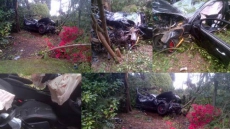HALIFAX — Past the rocky, ocean-battered coastline of Nova Scotia is an unlikely tale of success: a burgeoning wine industry producing palate-pleasers that connoisseurs say can rival what Champagne, France has to offer.
Winemakers in the lush heartland of Nova Scotia's wine industry, the Annapolis Valley, are embracing what might appear as an impossible set of conditions — cool temperatures and rocky, acidic soil — to create award-winning white and sparkling wines that are capturing international attention.
"There's this cardinal rule that basically dictates a great wine always has the ability to highlight the strengths of where it comes from," says Benjamin Bridge winemaker Jean-Benoit Deslauriers, who left the sun and surf of California in 2008 for Nova Scotia's Gaspereau River.
One of about 20 Nova Scotia wineries, Benjamin Bridge is the only Nova Scotia brand selling bubblies throughout Canada. Its claim to fame is Nova 7, a pale, refreshing spritz made from grapes grown along the Bay of Fundy.
Deslauriers says part of Nova Scotia's strength lies in its long grape-growing season where unspoiled vines can be plucked into November, allowing the fruit to retain its freshness at a moderate sugar content.
The province's other strength is a collection of keen winemakers and proponents working behind the scenes to grow the industry, which the government said boasted sales of $15.4 million last year.
On Tuesday, Nova Scotia and Ottawa announced $487,960 over two years for a new wine research lab in the heart of the valley at Acadia University in Wolfville. The lab is meant to be a hub for food scientists, dietitians, biochemists, plant physiologists and producers of food and beverages as the province looks to make a bigger impact.
Making wine in Nova Scotia is a "high-risk, high-reward dynamic," says Deslauriers, a Quebec native who has also worked in Chile.
"We end up being somewhat of a specialized wine region much like some of the regions in Europe that are either really high in the Alps or in the northern parts of France and Germany."
Toronto wine critic Tony Aspler says the province's wineries excel in sparkling wines and aromatic whites. Reds, however, "are more problematic in that climate."
That hasn't stopped Nova Scotia wineries from dabbling in reds and learning what does and doesn't work.
Gillian Mainguy of the Winery Association of Nova Scotia says early generation winemakers tried to compensate for the grapes they could grow during warm summers and long falls by producing wines that "were just way too sweet."
"It's not unlike what both Ontario and British Columbia went through," says Mainguy, citing Ontario's oft-ridiculed Baby Duck as an example. The sweet, sparkling, low-alcohol wine was popular in the 1970s but snubbed by connoisseurs.
She says a noticeable shift came in the early 2000s with the hiring of experienced winemakers who understood the terroir — a combination of climate, soil and terrain.
"We are making world class sparkling wines and aromatic whites that outside of a few other places in the world — Champagne, France and in the United Kingdom — can't be rivalled anywhere else," she says.
Roger Dial is widely considered the founding father of Nova Scotia's wine industry, having established what would become the Domaine de Grand Pre winery between the late 1970s and early 1980s.
There were "lots of doubters" in those early days, says Dial, who had previously owned a winery in California.
"We have some wonderful, huge assets now that we didn't have back in the '80s and the '90s and that's in the form of young, professional winemakers who are absolutely dedicated, not just to the profession and the craft, but to the place," he says.
"They want to be here, making history."
Many in the business agree a turning point came in 2012 with the creation of Nova Scotia's very first appellation — a kind of geographic recipe. Known as Tidal Bay, it is a crisp white wine meant to accentuate the region's cuisine, particularly seafood.
Using specific grape varieties, including 100 per cent Nova Scotia-grown grapes, a dozen wineries are producing a 2015 vintage of Tidal Bay under a strict set of standards that must be approved by an blind, independent tasting panel. Balancing the high acidity of the soil with residual sugars, Tidal Bay leaves "a nice pucker," says Mainguy.
Aspler says Nova Scotia's wineries have shown a level of co-operation unseen anywhere else in Canada.
"To create something that could be marketed as a Nova Scotia wine, that would embrace all the wineries who want to participate, it's a really interesting concept," he says.
Carl Sparkes, president of Jost Wineries of Malagash — the largest and longest-operating winery in Atlantic Canada — says it's not surprising that the industry in Nova Scotia is tight knit.
"I think we are mostly farmers at heart and therefore behave through similar values," he says. "Farmers will always be there to help out a neighbour, but are not without their bickering. All in all, though, I think everyone wants to see the industry grow and prosper. Common purpose trumps differences of opinion."
Still, growth in Nova Scotia has been slow going.
Dial says many more hectares also need to be planted if Nova Scotia wants to keep up with the likes of Ontario and British Columbia, which boast hundreds of wineries by comparison even though their industries aren't much older.
"While I treasure the small, artisan little wineries that we have, an industry needs big players," he says.
There's also the problem of getting products to new customers. Deslaurier says plans are underway for Benjamin Bridge to expand into the United States, the U.K. and Japan.
But Mainguy says "outdated" interprovincial barriers continue to make it difficult for wine lovers to order from outside their home province and tipple what Nova Scotia has to offer nowadays.
And that, she says, is a shame.
"This isn't your aunt's Nova Scotia wine," she says. "If you haven't tried it lately, try it again. You'll be surprised."




